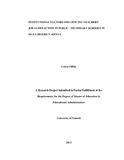| dc.description.abstract | The main purpose of the study was to investigate the institutional factors
influencing teachers’ job satisfaction in public secondary schools in Siaya
District, Kenya. The objectives of the study included determining the
influence of incentives, workload, teaching and learning resources and
supervision on teachers, on their job satisfaction in public secondary schools
in Siaya District, Kenya. The study provided empirical literature review
evidence on job satisfaction among secondary school teachers with respect to
working conditions, workload, incentives, availability of teaching and learning
resources and their supervision at work and attempted to identify work
dimension factors that affected the job satisfaction of teachers in secondary
schools.
The research design was a descriptive survey of public secondary schools
teachers in Siaya District. The study employed stratified and simple random
sampling techniques to obtain a representative sample. The study used primary
data that was collected using a structured questionnaire for teachers in public
secondary schools with both open ended and closed ended questions to
establish the motivational factors influencing teachers’ job satisfaction in
public secondary school teachers. The target population was 82 teachers from
public secondary school in Siaya District.
An analysis of the quantitative data collected is provided, which was discussed
using descriptive statistics and analysed using Statistical Package for Social
Sciences (SPSS) then presented in tables and graphs according to the study
objectives. Though incentives impacted on job satisfaction, different kinds of
incentives brought different levels of satisfaction. For instance, 74.4% were
not satisfied with their jobs despite having received gifts for various reasons in
their schools. Furthermore, 54 out of the 82 teachers disliked their jobs for
various reasons despite having received gifts for students’ good academic
performance. Therefore the most common form of incentive (gifts) did not
bring the desired levels of satisfaction among teachers. The study further
demonstrated that higher workloads occasioned lower levels of satisfaction
among teachers. For instance the study indicated that 18 in 34 teachers were
not satisfied with their jobs as a result of teaching over 30 lessons a week.
Furthermore 67.1% of the 82 teachers who were involved in other
responsibilities other than teaching were not satisfied with their jobs because
they expressed willingness to change their current jobs. Just like incentives,
different kinds of teaching and learning resources affected teachers’ job
satisfaction differently. Availability of library facilities showed the greatest
impact on job satisfaction with 6 in every 11 teachers whose schools had good
library facilities saying that they were not satisfied with their jobs. This
indicates that in every 11 teachers, 5 were satisfied with their jobs as a result
of good library facilities. | en |

